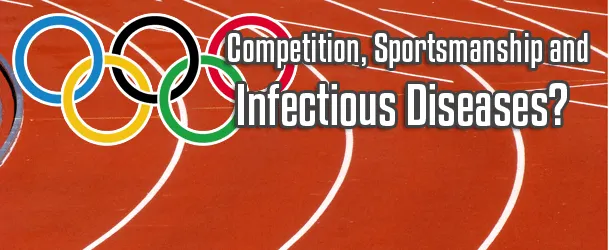
- Share on Facebook1
- Share on Pinterest
- Share on Twitter
Thousands of people from all over the world are descending on the already crowded city of London during the Olympic Games (July 27-Aug. 12). As even more people squeeze themselves into the city’s underground trains and buses, they may be sharing more than personal space. Mass gatherings provide the perfect opportunity for the spread of disease.

“There’s the potential to increase the importation and spread of diseases we don’t normally see in London,” says Brian McCloskey at the UK Health Protection Agency (HPA), although he adds that the risk is small.
While London will almost certainly experience outbreaks of diarrhea and food poisoning — which occur every summer — there’s only a small risk of anything exotic taking hold in the city.
Just in case, McCloskey and his colleagues have ramped up infection surveillance systems across the country. Normally it is down to doctors to report infectious diseases or unusual symptoms to the HPA. But because tourists are not registered with doctors in the UK, a system is going to be implemented in emergency rooms across London hospitals for the first time.
“It’s a very substantial ramping up of surveillance from our point of view,” says McCloskey. “No other country has done that for the Olympics.”
To keep track of infections in other countries that may be brought to London, the HPA is working with a number of groups, including the World Health Organization, the European Center for Disease Prevention and Control, and that of Kamran Khan at St. Michael’s Hospital in Toronto, Canada.
“A few years back, when SARS arrived in Toronto, I got a chance to see how an emerging disease really cripples a city,” says Khan. “That inspired me to start thinking about infectious diseases in a world that’s increasingly interconnected.”
Since then, Khan has been developing a system to track air passengers’ movements in order to predict how diseases might spread. His system, called Bio.Diaspora, holds information on 95 percent of commercial flights in the world — that’s more than 2 billion itineraries a year. It integrates these travel details with information on when and where diseases are cropping up and how a country’s economic and climatic conditions might affect the spread of any infections.
To spot emerging epidemics, the group not only uses information from the WHO and government reports, but turns to reports of local outbreaks, in the media or on social networks and blogs. They do this HealthMap, a system created by John Brownstein at Harvard University and colleagues, which trawls through thousands of websites around the world looking for key words that might signal an outbreak.
“We receive a continuous live stream of information,” says Khan.
On top of that, the team at Bio.Diaspora collect information on populations of animals and insects that could carry human disease, as well as environmental and climatic conditions. Flooding, for example, would be bad news in an outbreak of a water-borne disease like cholera.
The Olympics will provide the first opportunity for Khan’s team to put so many factors together in predicting the spread of disease.
“It’s quite exciting,” says Khan. “There’s a real opportunity for us to learn something from this and apply it to other mass gatherings.”
So what happens if the group detects an outbreak during the games?
“You could intervene in the host country, the UK, or target travelers in between,” says Khan. But checking whether people entering the country have a fever or not is by no means foolproof. “You need to screen a lot of people to pick up the few who are infected and you’ll miss people who aren’t showing symptoms.”
While Khan agrees that it’s unlikely London will be struck by an exotic disease during the games, he thinks there is a real threat of a measles outbreak. The disease seems to be having a resurgence in a number of European countries — where many visitors will be hailing from — as well as in the United Kingdom itself.
Olympic ticket holders are likely to be in an age bracket that’s thought to have the lowest level of immunity to the virus. While young people are likely to have received two doses of the MMR vaccine and older people will often have lifetime immunity after contracting measles when they were young, those in their 30s and 40s remain at the greatest risk of infection, having had only one shot. Add to that the fact that the virus is highly contagious — around five times more so than the flu — and conditions are ripe for an outbreak.
“It’s likely nothing extraordinary will happen,” says Khan. “But from a public health standpoint, you have to prepare for the worst and hope for the best.”
– Jessica Hamzelou, New Scientist Magazine
(C) 2012. NEW SCIENTIST MAGAZINE. REED BUSINESS INFORMATION LTD. ALL RIGHTS RESERVED. DISTRIBUTED BY TRIBUNE MEDIA SERVICES, INC.
- Share on Facebook1
- Share on Pinterest
- Share on Twitter

